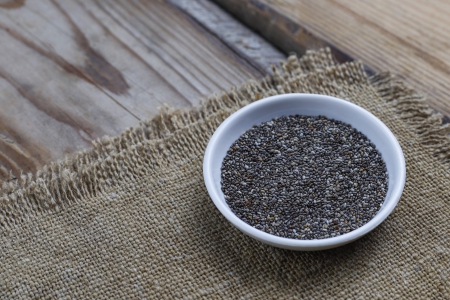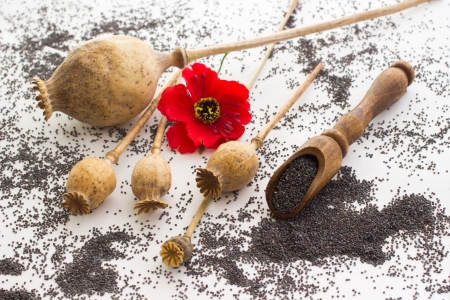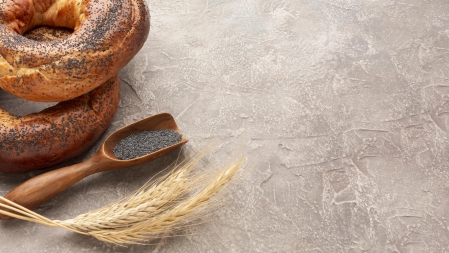Poppy seed is an important oil seed obtained from poppy plant also known as Papaver somniferum. It is well known for its therapeutic benefits and culinary usages. It has been extensively used for reducing the prevalence of asthma, cough, constipation, anti-inflammatory events and cardiovascular diseases.
Nutritional profile
- It contains moderate amount of carbohydrate and desirable amount of dietary fibre
- It contains significant amount of fat but completely free from cholesterol. Both fat saturated and unsaturated are found in poppy seed
- It also contains proteins
- It produces significant amount of energy during its oxidation as it contains both carbohydrates and fats
- It contains several vitamins such as Vitamin C, Vitamin E, thiamin, riboflavin, niacin, pantothenic acid, pyridoxine and folic acid
- It is rich in copper and manganese but also contains various other essential trace elements like calcium, phosphorus, magnesium, sodium, potassium, selenium, zinc and iron
- It contains numerous polyphenolic compounds as well especially alkaloids such as noscapine, morphine, thebaine, papaverine and codeine
Health benefits
Role on reproduction
- It helps to prevent female infertility
- It has seen that poppy seed oil helps to dissolve mucous and debris from fallopian tube and hence increases the chance of achieving pregnancy
- It is also associated with enhancing libido

Role on skeletal system
- Calcium and copper components of poppy seeds are considered as the chief components accountable for improving bone health
- Calcium and phosphorus components of poppy seed also help to increase the synthesis of bone tissue (as calcium phosphate is an integral part of bone tissue)
- It helps to increase bone mineral density
- It is also responsible for increasing bone strength
- It helps to decrease joint inflammation
- Manganese component of poppy seed helps in the synthesis of collagen, which is associated with protecting bones from injuries
Role on improving brain function
- Trace element components of poppy seed (especially copper, calcium and iron) are responsible for regulating the release of neurotransmitter, which help to improve brain function
- It also helps to improve cognitive ability
- It has the ability of creating calming effects that help to reduce anxiety as well as stress and promote healthy sleeping by preventing insomnia
Role on immunity
- Zinc is considered as one of the most important trace elements found in poppy seed responsible for enhancing immunological responses of body
- It is associated with increasing the synthesis of immune cells

Anti-carcinogenic activities
- It helps to prevent the growth of malignant cell by inhibiting proliferation of cancerous cell
- It also helps to fight against tumor
- It is associated with increasing the activity of glutathione-S-transferase or GST (an enzyme responsible for detoxifying carcinogens)
- It has seen that the drug noscapine is formed by poppy seed derivatives and extensively used for reducing the prevalence of prostate and colon cancers
Role on eye
- Consumption of poppy seed is very beneficial for improving vision
- Antioxidant property and zinc component of poppy seed are responsible for protecting eyes from damages and reduce the prevalence of eye disorders especially macular degeneration
Role on skin
- Antioxidant effects of poppy seed are responsible for providing proper nourishment to the skin that promotes skin health
- Poppy seed helps to moisturize the skin
- It also acts as an effective cleanser and enhances the skin glow
- It helps to prevent skin inflammations and infections
- It also helps to treat eczema
Role on hair

- It helps to prevent hair loss and improve hair thickness as well
- It is also beneficial for reducing dandruff
- Several hair packs can be made with soaked poppy seeds (blended) in home and can be well used for stimulating hair growth
Therapeutic usages
- Poppy seed is a good source of essential fatty acids, which are responsible for reducing cholesterol concentration and thus it is extensively used for promoting cardiac health. It has seen that consumption of poppy seed helps to reduce the prevalence of heart attacks
- It also used for reducing blood pressure. Its oleic acid component is very beneficial for preventing hypertension
- It is effectively used for treating the consequences of kidney stone and helps to prevent its reoccurrence
- It is also used for enhancing thyroid functions as it contains significant amount of zinc, which is an essential trace element required by the thyroid gland for performing its function effectively
- It is well used for pain relieving purposes. It has been used traditionally for reducing pain and discomfort within patients. Recently poppy seed tea is greatly used for this purpose
- Consumption of poppy seed is also beneficial for diabetic patients. The manganese constituent of poppy seed is the major element that helps to treat hyperglycemia
- It is used to treat mouth ulcers as well
- It is also used for treating digestive disorders as it is considered as a good source of water insoluble fibre that helps in digestion process
- It is also very useful for reducing the prevalence of constipation

Usage of poppy seed in cooking
- A paste of poppy seed is used with potatoes for preparing a rich creamy potato curry
- It is also added with buttered egg noodles
- It is used in salad and vegetable dressing
- It is also used for preparing confectionaries
- It is used for the preparation of breads, pastries and cakes
Recent findings
- Recent studies have shown that tea made up of poppy seed has strong analgesic effects and effectively used for relieving pain but according to this research it has seen that unwashed poppy seeds contain significant number of alkaloids. So, tea, which contains poppy seed, has substantial content of morphine (due to the alkaloid component of poppy seed) and thus its regular use can cause dependence and also may develop several disorders (Haber et al., 2019)
- Several researches have been carried out on poppy seed, which have shown that excessive consumption of poppy seed is very dangerous. It may cause death due to bowel obstruction (Schuppener and Corliss, 2018)
General consideration of using poppy seeds
- The seeds should be cleaned properly before use for removing impurities
- Then the seeds should be soaked in warm water at least for 2 hours followed by draining and then they should be subjected for drying
- After that, the dried seeds can be used for consumption either in ground form or raw

- To avoid contamination, it should be stored in a dry and cool place within an airtight container
Risk factors
Consumption of poppy seeds more than recommendation is very harmful as it causes severe toxicity such as –
- It has seen that alkaloid components of dry and unwashed poppy seeds have various beneficial effects on human body like they helps to reduce nervous irritability, treat cough, acts as natural pain killer but in high dose it can damage nervous system
- It often develops allergic reactions
- Excessive consumption of poppy seed may develop nausea, vomiting and other gastrointestinal disturbances
- It also causes swelling of eyes and mouth in large dose
- It has seen that over consumption of poppy seed causes severe breathing problems

Source:
Aslam, M., 2019. Tukhm Khashkhaash (Poppy Seeds): A Unani drug of multitudinous potential. Journal of Drug Delivery and Therapeutics, 9(2), pp.528-533.
EFSA Panel on Contaminants in the Food Chain (CONTAM), 2011. Scientific Opinion on the risks for public health related to the presence of opium alkaloids in poppy seeds. EFSA Journal, 9(11), p.2405.
Haber, I., Pergolizzi, J. and LeQuang, J.A., 2019. Poppy seed tea: a short review and case study. Pain and Therapy, 8(1), pp.151-155.
Krošlák, E., Maliar, T., Nemeček, P., Viskupičová, J., Maliarová, M., Havrlentová, M. and Kraic, J., 2017. Antioxidant and proteinase inhibitory activities of selected poppy (Papaver somniferum L.) genotypes. Chemistry & Biodiversity, 14(9), p.e1700176.
Martínez, M.A. and Ballesteros, S., 2019. Opium poisoning in modern times. An overview. Forensic science international, 302, p.109848.
Schuppener, L.M. and Corliss, R.F., 2018. Death due to complications of bowel obstruction following raw poppy seed ingestion. Journal of forensic sciences, 63(2), pp.614-618.
Sharopov, F., Valiev, A., Gulmurodov, I., Sobeh, M., Satyal, P. and Wink, M., 2018. Alkaloid Content, Antioxidant and Cytotoxic Activities of Various Parts of Papaver somniferum. Pharmaceutical Chemistry Journal, 52(5), pp.459-463.



